
Both Claire and I at Walden Sweeps wish all our friends and customers a very happy Christmas and a prosperous New Year.

Both Claire and I at Walden Sweeps wish all our friends and customers a very happy Christmas and a prosperous New Year.
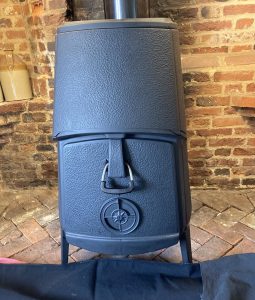
I just had to include this stove in my blog, as it is just so unusual, as the customer put it, ‘it is always a real talking point’! The customer had recently moved to the address in Debden from the East Suffolk area. He said that one of the main selling points of the house had been this unusual stove. As you can see it is a Jotul NR-4 Wood-Burning Stove, and which has a very retro appearance, which I suppose is not to everyone’s taste. The customer told me that he had read somewhere that the Jotul NR-4 is modeled on the monolithic statues found on Easter Island. The statues that Eric Von Daniken thought that aliens had visited the earth in ancient times in his book ‘Chariots of the Gods’. Looking at the stove I can see the resemblance now that the customer had mentioned it, the large flat nose and heavy brow ridges! Can you see the likeness too?
I could not find much information about these Jotul NR-4 stoves on the internet and they do not feature in the current Jotul stove range, so I’m guessing that they are no longer in production. I did see one for sale on EBay for just £525, a bargain I would say for such an unusual retro stove.
Jotul are a Norweigan company and have been making stoves and fireplaces for over 160 years. Jotul are proud of their global status, selling their products in 43 different countries spread over six continents – Truly a global brand!
Jøtul was founded by Oluf Onsum as Kværner Jernstøberi (Kværner Foundry) in the outskirts of Christiania (now Oslo) in 1853. While stoves initially were the main products, the company had diversified by the beginning of the 20th century, when it produced turbines and lumber equipment.
As the heating appliance manufacture decreased in importance, the production was spun off in 1916 and sold to Herman Anker, one of Kværner’s managers. He founded Jøtul AS in 1920 as a sales organization for its products. The sales stagnated during the depression in the 1920s, and 36-year-old Herman Anker died in 1927, leaving it to his successor, 34-year-old Johannes Gahr to modernize and eventually salvage the company. By 1935, the turnaround had succeeded, and the firm acquired its modern name.
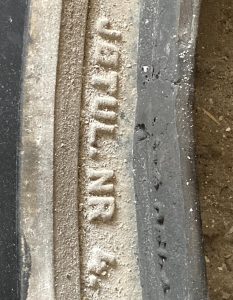
By the 1960s, stoves using liquid fuels, especially kerosene had supplanted wood-burning appliances, a trend that was only reversed in the 1970s, partly due to the 1973 oil crisis. Jøtul used this opportunity to gain a strong international foothold and drastically increased its exports to continental Europe and North America.
The Gahr family sold the business to Norcem in 1977, and a period of international expansion began, as Jøtul acquired a number of foundries and importers abroad. This period lasted for approximately ten years, but came to an end during the recession in the late 1980s, when Jøtul once again focussed on the domestic market. However, it has resumed its international diversification in the 21st century, and today its products are sold worldwide.
In March 2018, Jøtul was acquired by the global private equity firm OpenGate Capital. Along with management, OpenGate has crafted a plan to boost performance and eliminate inefficiencies in Jøtul’s operations. In addition, OpenGate Capital is actively searching for add-on targets to further drive Jøtul’s growth. In November 2018, OpenGate and Jøtul completed the add-on acquisition of AICO, an Italian and French based pellet-burning stove leader.

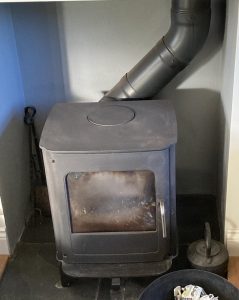
Not every stove installation is an easy and straightforward affair. Here is an example that I came across at an address in Cardinals Green recently. Here in order to match the fireplace opening to the chimney the installer has had to use anything but a vertical stove pipe. As you can see the stove pipe in this example has had to adopt a 45 degrees diagonal turn to access the chimney. I would not say that it is the most attractive of installations, but I suppose that its better this than no stove at all and I’m also thinking that once it’s had been installed a person would get used to it and not notice its strange appearance? Certainly, the customer was very pleased with the stove and reported using it every night of the winter.
I must admit that the Morso 06 is not a stove I come across frequently, in fact I only sweep one other example of this model in the area. Whilst I sweep many smaller Morso stoves, particularly the Squirrel, the Badger, and the 03 and 04. What is certain, whatever the size of the Morso stoves all my customers who have one really rate their performance and their appearance and would not swap them for a different stove. As in the case of this Morso 06, the customer told me that it warms the room fantastically well and is very efficient and economic in the fuel it uses.
Morso are a Danish stove company who have been making metal consumer goods since 1953. It was Neils Christensen who founded the Morson Foundry making all sorts of products including metal stable windows, tools, pots and pans and even grave crosses. Around the turn of the century Morso began to start making tiled stoves and room heaters for schools, churches, railways, government ministries and even to the Danish Royal Family. Indeed, so successful where they, that in 1915 they became the official purveyor of stoves to the Danish Royal Family. Its was in the 1950 when tiled stoves became obsolete that Morso began producing Wood-burning Stoves.
Morso Stoves UK
Unit 14B, Davy Court, Castle Mount Way, Rugby, Warwickshire CV23 0UZ
01788554410
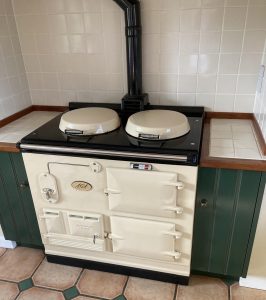
It is surprising to find that many people don’t think that their Aga cooking ranges require sweeping. I suppose that it is not that surprising when I meet people all the time that think their wood-burning stove doesn’t require sweeping. I hear comments such as “it’s a sealed system so doesn’t require sweeping”, or “It’s lined and is a modern installation” . . . Like that makes any difference! I find it is an up-hill battle educating some people around the risks arising from not sweeping the chimneys of their appliances. So, with regards cooking ranges, this includes all cooking ranges including Rayburns and Esse and others that are burning solid fuel, oil or gas. If they are burning these fuels and are open flues, i.e., they have a chimney, they will require sweeping. Unsurprisingly I do sweep a lot of cooking ranges across the area. Admittedly, many ranges don’t require the same frequency of sweeping as wood-burning stoves and open fires, particularly oil and gas appliance. What I suggest that my customers do is to ensure that the service engineer smoke tests the appliance at the end of the service. In this way they can check the draw of the chimney and if it is not satisfactory the customer can call in the sweep to clean the chimney.
I took this photograph of an Aga Cooking Range I swept recently at an address in Waltham Cross near Finchingfield. I was interested in putting this appliance in my blog as you can see from the photo it is rather an old range, that the customer has had renovated and restored to pristine condition. The customer said that he believed that this model of Aga dates from the late 1940’s. I don’t know whether this is true or not, but it is certainly an impressive range and a prominent, attractive feature in any kitchen.
The Aga range has had a long an interesting history, I found the following on the internet: he AGA cooker wasn’t conceived in a research facility. It was dreamed up in a kitchen. Its inventor, Dr Gustaf Dalén, was a Swedish physicist blinded in a terrible accident. In 1922 he was convalescing at home when he realised his wife was using a range that was dangerous, dirty and exceptionally time consuming. He wanted to create a cooker that was instead clean, economical to run, easy to use and which produced great food with the minimum fuss. In doing so, he invented a cooker that changed the lives of cooks the world over. The AGA was an immediate success and came to Britain in 1929. It has been at home ever since.
It was during the 1930s that Britain’s love affair with the AGA really took hold. A key player in this success was David Ogilvy, who went on to found the leading advertising agency, Ogilvy & Mather. While at AGA he wrote The Theory and Practice of Selling an AGA Cooker, which has been described by Fortune magazine as ‘the finest instruction manual ever written’. Amongst his gems of advice, Ogilvy suggests that a successful salesman combine ‘the tenacity of a bulldog with the manners of a spaniel’.
During the war years the AGA played its part. The British government placed orders for AGA cookers for munitions works, communal feeding centres and hospitals. Demand rose steeply from families too and the waiting period for a new cooker was more than six months.
In 1947 the company began manufacturing its cookers in Shropshire, where they are still made today.
For 34 years, the AGA had been available only in cream, but in 1956 all that changed. The introduction of the new AGA De Luxe models in pale blue, pale green, grey and white proved hugely popular with AGA lovers. It was around the same time that the famous AGA chrome-plated lid domes were introduced.
The 1960s saw the first iconic black AGA lozenge logo, which is still used today. But the changes introduced during this time weren’t just cosmetic – solid fuel was falling out of fashion as people wanted cleaner, more convenient energy sources. This led to the launch of oil and gas-fired AGA cookers. The 1970s saw the launch of further new colours, including black, which still proves hugely popular today.
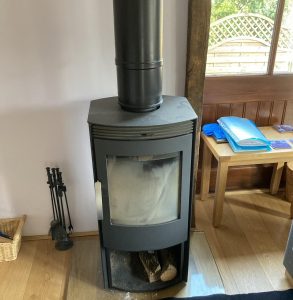
Now here is a German make of stove that I have not come across before, a Termatech TT40 Wood-Burning Stove that I came across recently at an address in Thaxted. Its funny that it was fitted by a local stove company and was not a bespoke stove requested by the customer, but I just don’t see this make of stove around the area. Its not even that it’s a new installation as it had been in use for a number of years now and the company Termatech no longer make this model of stove. Presumably when it was fitted, this model of stove was an end of a line?
The customer is more than happy with the stove which is in a barn conversion that is a holiday let adjacent to a farm. Being a barn conversion, the stove has to heat a rather large open plan space, something guests have told the customer that it does very well. I think it is an ideal finishing touch to a holiday let. I think most people can imagine the end of a holiday day, relaxing in front of this stove with a glass of wine? The bran itself is very old and has a wealth of exposed beams, so the stove which has a very contemporary feel to it makes a nice juxtaposition with the historical setting of the barn. A most pleasing effect! The manufacturers state in the operating manual that the stove has a 5Kw output and a 79.6% efficiency rating. As the property is older that 2008 and the stove is only up to 5Kw output rating, there is no requirement for additional ventilation (Building Regulations – Approved Document J). The installer did have a tricky install, having to safely fit the flue up through the ceiling and roof, as the roof beams are positioned very close together. This was safely achieved by using a twin wall flue all the way up from the stove and out through the roof space.
Termatech are a Danish company which commenced production in 2003. The company prides itself on manufacturing high quality stoves that provide great value for money and appeal to the middle of the stove market. In addition to stoves, they manufacture a range of stove accessories and factory-made chimney components and liners; producing a range of over 2,500 stove products. The marketing blurb pronounces that “the basic philosophy behind our products, besides establishing a balance between quality and price, is to focus on design, technology, function and the environment”. They state that whilst their stoves must be appealing to the eye, they must also be environmentally friendly as well. Since 2008 Termatech has been part of the Swedish company Nibe Industria AB.
Termatech
Gunnar Clausens Vej 36
DK-8260 Viby J
Denmark
Email: info@termatech.com
Operating manual: file:///C:/Users/Claire/Downloads/tt40_product_range_user_manual_1_29252.pdf
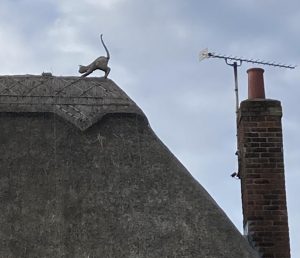
I realized this week that I had not had a thatched animal blog for some time when I saw on the roof of a house we were working in this thatched cat and mouse. Yes, the people living in the house did have a cat! I have seen thatched cats on rooves before, but not a cat and a mouse before.
Here is a famous Cat and mouse poem by Ted Hughes
On the sheep-cropped summit, under hot sun,
The mouse crouched, staring out the chance
It dared not take.
Time and a world
Too old to alter, the five mile prospect—
Woods, villages, farms hummed its heat-heavy
Stupor of life.
Whether to two
Feet or four, how are prayers contracted!
Whether in God’s eye or the eye of a cat.
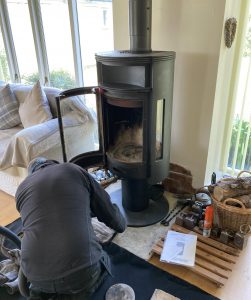
Although I sweep a lot of Contura stoves, they tend to be the smaller models, however I came across this Contura 655 Wood-Burning Stove at an address in Stebbing Green the other day. As you can see from the photo it’s a rather large stove; the manufacturers state that it has a 6Kw output and a 78% efficiency rating. This installation is in a barn conversion and therefore has to heat a rather large open plan space, the customer did state emphatically that it is more than fit for this purpose and heats the room very well indeed. I don’t know if you can see on the photograph, but the stove was sited on a rather attractive stone plinth. This had a rather rough appearance but has the quality if not showing up any dust or soot and would be very hard to scratch or damage, unlike some other softer stone hearths that are easily during everyday stove use damaged. As the stove is over 6Kw rated and the barn was converted after 2008 the installers had complied with building regulations (Approved Document J), by placing an open vent in the outside wall directly behind the stove. Needless to say that the customer is more than happy with this stove, he told me how attractive it was when it was alight and how cosy it made the place, the ideal finishing touch to his barn conversion.
Contura Stoves are a Swedish company based in the town of Markaryd – Markaryd is a municipality in Kronoberg County at the southern tip of Sweden. Contura Stoves are known for their distinctive contemporary stove designs and the appliance of the most up to date stove technology.
Contura Stoves
Box 134
Skulptorvagen 10
285 23 Markaryd, Sweden
T: 046433275100
Operating Manual: https://www.contura.eu/download/18.28fd1971167380f020b439/1543496447447/iav_Contura_655_gb.pdf
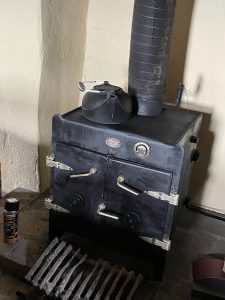
Recently, a chap who had been reading my weekly blog sent me these photos of his Goodwood Stove in the holiday home that he had recently bought in Italy. You might remember that some time ago now I posted a blog about a Goodwood Stove that I had come across in a farmhouse in the Hempstead area. Since that time, I have been contacted by a number of people, including a couple of chimney sweeps, from all over the UK who have come across these stoves, many of which are still in operation. Although a number of them have been from the north of England. But certainly, Italy is a first! The owner had been cleaning the stove up and repainting it but was after finding out how to source a new grate as his old one had a hole burnt through it! I’m not so sure about the flexible steel liner (painted black) being attached straight on to the flue collar of the stove, this really should be a stove pipe up to a register plate. As can be seen in the photo it also has an old-fashioned flue damper, which is no longer standard in this country. I’m guessing that the Building Regulations in Italy are not as tight as they are here?
My previous internet search found that the Interoven company who made the Goodwood Stove ceased trading some time ago. There are some interesting historical adverts for the company dating from Victorian and Edwardian times right through to the 1950’s, but nothing after that. These advertisements are worth a look, just to see how quirky they are and for their historical interest! With straplines like “the original not a pirate” and “how to reduce gas and coal bills, a heating miracle”. Check out Graces Guide to British Industrial History – https://www.gracesguide.co.uk/Interoven_Stove_Co
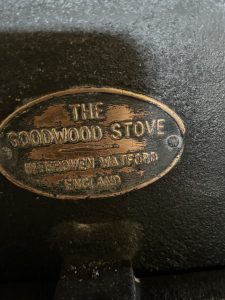

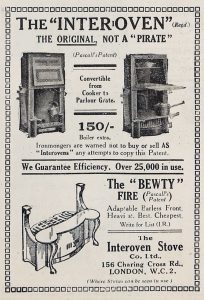
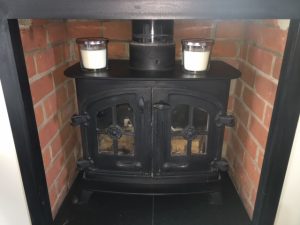
Probably one of the commonest if not the most common stoves that I sweep in the area. The Yeoman Devon Wood-Burning Stove, I recently swept this one at an address in Farnham. This model is the Flat-Top version, but they also come in a high-top version with a hood over the top of the stove, but the flat-top is the more common of the two. But this is not why I wanted to mention this stove in my blog, the point is that when I come to sweep this make of stove, I invariably find that a great deal of part burnt material (i.e., soot and tar) has collected on the top side of the baffle during the burning season. Clearly, such a build-up of part burnt products of combustion on the top of the baffle presents a fire risk. As with most stoves the manufacturers operating instructions, the stove operator is directed to remove the baffle once a month and clean these deposits off the top of the plate. I have never seen this done yet as most customers are not aware of this direction. As can bee seen in the photographs, there was a reasonable build-up of part burnt material on top of this baffle plate in Farnham.
The baffle plate in the Yeoman Devon Wood-Burning Stove is extremely easy to remove and clean. The plate is held up by two pins in the front top of the firebox that are secured in place by two roller sleeves which slide over the pins. The back of the baffle plate sits either on the top of the rear firebricks or on a little metal ledge just above the firebricks. To drop the baffle plate you simply withdraw the two roller sleeves from their pins and let the baffle plate fall forward. It can then be cleaned. To replace it you simply reverse the removal procedure. Easy!
Yeoman Stoves are now owned by stovax, but you can find them at:
Yeoman Stoves,
Falcon Road,
Sowton Industrial Estate
Exeter, EX2 7LF
Technical Enquiries: 01392261950
Customer Services: 01392474500
https://www.yeomanstoves.co.uk/stove/county-wood-burning-and-multi-fuel-stove/
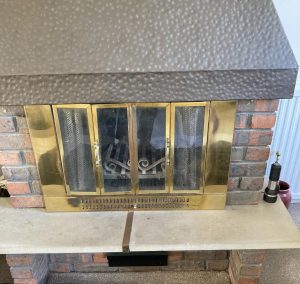
Yes, this is a rather unusual Combination Stove I recently swept at an address in Stebbing. I have not seen one like this previously, although I do see many other combination stoves, usually Dovre or Nord which seem to be the most common varieties. The customer told me that this stove was fitted in the mid 1960’s and was, manufactured in Sweden, but could not remember the makers name or model. There was no plate that could give any idea as to who the manufacturer is or what model it was? I did try and see if I could find anything like it on the internet but was unsuccessful. The customer said although it looks like an open fire that could burn anything, it is actually designed to only burn wood and that it burns the wood very efficiently and thoroughly. The installation is on the original chimney clay liners which date to the early 1960’s.
The customer was also experiencing Jackdaw activity in the chimney. There was no cowl fitted to the open chimney pot, so I suggested fitting an anti-bird cowl as a terminal to prevent the Jackdaws building a nest in the chimney. I gave him contact numbers for Gary Wats of Watson & Woolmer Ltd in Debden, who fits a good quality anti-bird cowl – 01799 541846, (M) 07736 678877